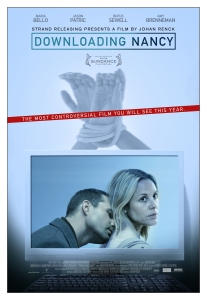By: debbie lynn elias

Leave it to Maria Bello to tackle one of the most challenging and controversial film roles of the year. Always known for her diversity, not to mention gutsy, fearless and often eclectic performances, with DOWNLOADING NANCY, Bello reaches the pinnacle of her thus far seen vast talents, turning in a performance as Nancy that is mesmerizing, disturbing, interesting and dripping in Oscar gold.
Nancy is a severely disturbed young woman with sadomasochism rooted deep in her psyche. Stemming from painful sexual abuse as a young child at the hands of her uncle, Nancy’s perceptions were inexplicably altered for life, causing her to understand that pain is pleasure and pain is love and that by allowing someone to cause you pain when it gives them pleasure is a way of returning love. It also means that in addition to the physical scars of her youth, she is severely mentally scarred. Now, her only means of solace are over the internet with unknown men who feed her fetish for pain and self-inflicted pleasure of cutting herself with razor blades. Married to an egomaniacal “businessman” named Albert, he is oblivious to Nancy, her condition or her needs. Her cries for help and for love fall on deaf ears.
But Nancy finds solace elsewhere – on the internet with a man named Louis. A man who she seeks out to “wipe the slate clean” for her. A man who fulfills her need for pain and pleasure just by typing some words on a computer or engaging in video communication. A man who understands not only Nancy’s needs but his own. A man who does, in some bizarre twisted fashion and fate, love Nancy.
 Under the care of a psychiatrist, it becomes clear that not only is Nancy extremely intelligent, but a performer, able to convince this rather inept psych that she is making progress and no longer desires to hurt herself. Unfortunately, the psychiatrist misses the fact that Nancy is becoming more suicidal with each passing minute, convinced that death is her only answer. Living multiple public lives and one private hell, Nancy climbs deeper into her life on-line until she disappears one day, leaving a note for Albert that she went to see “a friend.” And what happens after that will blow your mind, for the “friend” Nancy visits is none other than Louis.
Under the care of a psychiatrist, it becomes clear that not only is Nancy extremely intelligent, but a performer, able to convince this rather inept psych that she is making progress and no longer desires to hurt herself. Unfortunately, the psychiatrist misses the fact that Nancy is becoming more suicidal with each passing minute, convinced that death is her only answer. Living multiple public lives and one private hell, Nancy climbs deeper into her life on-line until she disappears one day, leaving a note for Albert that she went to see “a friend.” And what happens after that will blow your mind, for the “friend” Nancy visits is none other than Louis.
This is without a doubt “the” signature independent role that actors beg to have just once in their life; the role where they get to really show what they are made of. This IS that role for Maria Bello. As difficult a role and performance as that created by Sally Field in “Sybil” or Joanne Woodward in “Three Faces of Eve”, here, as Nancy, Bello hits every mark, every emotion, every little physical tic and insecurity running from orgasmic to suicidal but with a very clear, cogent and logical reasoning for each action and reaction. In one moment, she is like a little girl, lost, and looking for approval. In the next, she is tough, confident, rational and independent showing great inner strength and survival. Just watch her hands and fingers, playing with her sleeves, or the way she walks with her left leg slightly tilted inward like a kid shuffling his feet. Or playing with her hair or even how she “styles it ” and when. She made me feel like Nancy was a sad mystery that will never be truly unlocked yet somehow you understand her completely. Her sorrow and her strength and her needs are relatable to us all – although most of us aren’t running around cutting our bodies up for pleasure or attention or emotional flagellation. You can’t take your eyes off of her. She mesmerizes and commands every scene.
 Jason Patric is stellar as the dichotomous and conflicted character, Louis. Serving as Nancy’s self-appointed executioner, Patric balances that bringing a warmth and caring to Louis that gives the audience an understanding into the depth of his love for Nancy, and perhaps, even the penance Louis is paying for what he did in his own life that cost him his children.
Jason Patric is stellar as the dichotomous and conflicted character, Louis. Serving as Nancy’s self-appointed executioner, Patric balances that bringing a warmth and caring to Louis that gives the audience an understanding into the depth of his love for Nancy, and perhaps, even the penance Louis is paying for what he did in his own life that cost him his children.
Together Bello and Patric are spellbinding, drawing you into this fractured, fragmented world where each is lost, but together they appear as one. Their relationship is a carefully choreographed dance as if a prima ballerina balancing on her toes to applause and oohs and aahs, but internally fearful of falling on her face.
 Rufus Sewell easily handles the role of Nancy’s husband Albert. Unlikeable, unsympathetic and a self-absorbed jackass – a perfect performance! I kept hoping Nancy would take one of the razor blades and just slit Rufus’ throat and put herself and us out of misery. You want to see him get his come-uppance and you know it’s coming at some point when Nancy is telling Louis her two wishes. You see Louis’ love for her and you just know, he will make sure she gets the last word.
Rufus Sewell easily handles the role of Nancy’s husband Albert. Unlikeable, unsympathetic and a self-absorbed jackass – a perfect performance! I kept hoping Nancy would take one of the razor blades and just slit Rufus’ throat and put herself and us out of misery. You want to see him get his come-uppance and you know it’s coming at some point when Nancy is telling Louis her two wishes. You see Louis’ love for her and you just know, he will make sure she gets the last word.
Amy Brenneman was a disappointment as Nancy’s psychiatrist. Too unsure, uncertain and mamby pamby. While the weakness of her character was a wonderful parlay against that of Nancy, to see Brenneman in the role was a waste of her talents.
Screenwriters Pamela Cummings and Lee H. Ross give us one of the most intimate and intriguing character studies to come around in many a day. Based on true events, the script – and Bello’s performance – captures the psychological pain, loneliness and despair of Nancy, translating it into a story that is both comprehensible and compelling to the audience. Told by way of flashbacks that eventually catch up with real-time, Cummings and Ross spin a web that draws you ever deeper into Nancy’s psycho-sadomasochism and emotional black hole but balance that darkness with the “relationship” she does have with Louis and his more than obvious true affection for her.
 For a first film to helm, Johan Renck does an amazing job with a very difficult story and jigsaw format. To elicit the performances he has here, especially from Bello who is so particular and exacting in her work, tells me right there of his caliber as a director. Graphic visuals and some masochistic sexual foreplay, not for the faint of heart, serve to fuel Nancy’s rage, but also provide a sense of salvation and glimpses of “what if joy”, hope and even some childlike innocence and happiness. Renck walks a very thin line as many parts of this film border on being just this side of “snuff”, something I would call a very bold and daring move with your first American feature. Feeling out of place and stilted, but relevant to the character of Albert, are Albert’s male bonding scenes with his buddies and get togethers in his “customized” basement promoting his latest get rich quick scheme, indoor computer-enhanced driving ranges for airports lounges. Distinctive are the pops of color and tonal changes for these sequences that disrupt the emotional pallor of the rest of the film.
For a first film to helm, Johan Renck does an amazing job with a very difficult story and jigsaw format. To elicit the performances he has here, especially from Bello who is so particular and exacting in her work, tells me right there of his caliber as a director. Graphic visuals and some masochistic sexual foreplay, not for the faint of heart, serve to fuel Nancy’s rage, but also provide a sense of salvation and glimpses of “what if joy”, hope and even some childlike innocence and happiness. Renck walks a very thin line as many parts of this film border on being just this side of “snuff”, something I would call a very bold and daring move with your first American feature. Feeling out of place and stilted, but relevant to the character of Albert, are Albert’s male bonding scenes with his buddies and get togethers in his “customized” basement promoting his latest get rich quick scheme, indoor computer-enhanced driving ranges for airports lounges. Distinctive are the pops of color and tonal changes for these sequences that disrupt the emotional pallor of the rest of the film.
Technically, the film is superlative. Use of extreme denaturization of color lends to the bland, plain, surreal and vacant – just like Nancy’s life – and which allows Nancy to just blend into the woodwork as if she doesn’t exist. Perfect cinematography by Chris Doyle, who always provides an interesting visual experience – just look at “Paranoid Park” which he did with Van Sant or “The White Countess” or even Van Sant’s “Psycho.” When you need fractured instability and mental frailty, Doyle is the go to guy. A lot of hand held camera work (which I appreciated) gives that “unstable” visual sense that corresponds with Nancy mental state. Shot in the dead of winter in a frigid Saskatchewan only furthers the deathly pallor of Nancy and her story.
An intriguing and mesmerizingly complex and intricately woven psychological profile and character study of a fascinating woman, DOWNLOADING NANCY is a film to be appreciated on the big screen but is also a perfect download to watch in the privacy of your own home when you’re alone and feeling sorry for yourself.
Nancy – Maria Bello
Louis – Jason Patric
Albert – Rufus Sewell
Directed by Jonathan Renck. Written by Pamela Cummings and Lee H. Ross












